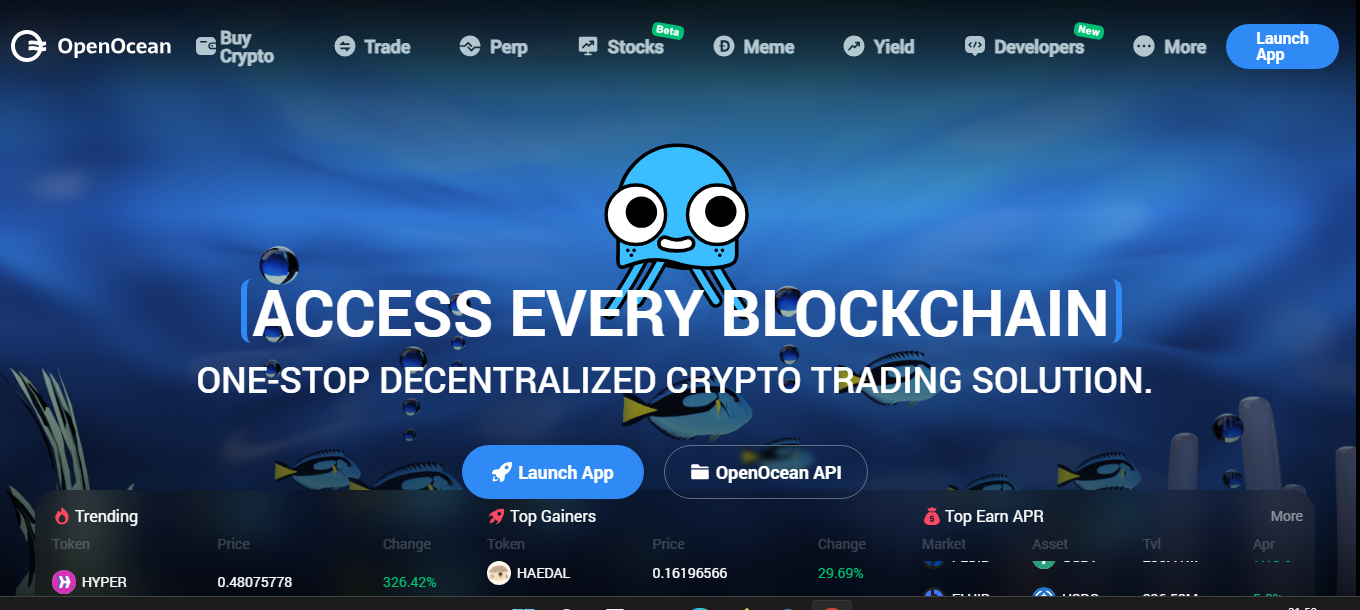OpenOcean DEX Aggregator Review - Best Rates Across Chains?

OpenOcean is a top-tier multi-chain DEX aggregator pulling liquidity from both DEXs and CEXs. It’s designed to give you the best price and lowest slippage by optimizing smart order routing across over 30 chains and 1,000+ liquidity sources.
Key facts at a glance
Why people use OpenOcean
- It routes across a wide network of chains and pools, aiming to deliver the best execution price.
- Advanced routing splits your swap into smaller legs for reduced gas and slippage.
- It offers cross-chain swaps in one unified interface - no need to jump between bridges or chains manually.
- Token holders get perks - stake OOE for governance and fee rebates, and qualify for slippage/gas reimbursement.
- It backs up its tech with API/SDK access, attracting dapps and DeFi wallets.
Pros & cons
Pros
- Smart routing across 30+ chains with deep liquidity
- No added protocol fees - only network costs apply
- OOE token boosts discounts, rebates, and subsidy eligibility
- Emerging order types like limit orders and future perps
- Developer-friendly via APIs and integration tools
Cons
- Only crypto deposits are possible - no fiat lanes
- Withdrawal fees vary based on chain and source
- No native P2P options - must use integrated liquidity
- Deposit/withdrawal UX still feels like a 2 out of 10 in reviews
- Smart contract risk remains, and subsidy mechanisms aren’t always active
Fees, liquidity and routing power
OpenOcean doesn’t tack on its own fees - it only passes through existing DEX or CEX pool charges. That makes your cost equal the best available rate plus gas. Spot maker/taker swap fee sits around 0.1 percent, which is competitive with other aggregator norms.
Routing is the standout feature. It uses Dijkstra/D-star to identify optimal paths and then adjusts mid-swap via machine learning for real-time optimization. This often beats simple single-path swaps, especially for multi-chain or low-liquidity tokens.
Token utility & incentives
OOE isn’t just a vanity token - it has actual utility. You stake it to participate in governance and earn partial rebates or gas refunds, up to limits per month. Subsidy systems protect you against unfavorable slippage or high gas usage, although eligibility depends on ongoing campaigns.
Tokenomics include staking, mining, governance and subsidy pools - all aimed at keeping users engaged while funding network growth.
Security & smart contract trust
Because OpenOcean acts on-chain, it avoids central custody and keeps security in the hands of smart contracts and third parties. It’s fully non-custodial - your funds never leave your wallet unless you authorize the transaction.
Back-end contracts support routing, swaps, limit orders and subsidy logic. While audits aren’t widely publicized, the open-source nature and community watch help catch flaws. Still, always assess smart contracts yourself before committing large sums.
User feedback & caveats
Reddit users praise the routing but warn about gas costs on tight or tiny swaps. One user said it provides the best rate, but often costs a bit more gas than trading on a native Dex.
Fee reviews show no deposit cost, 0.1 percent swap fee, but some withdrawal and P2P fees apply. UX and complex features may feel overwhelming to beginners, though pro traders appreciate the power.
Final take
OpenOcean is a powerhouse for anyone who values best-price swaps across chains without paying extra protocol fees. It’s smart, cross-chain, fully non-custodial and backed by real token perks. But it’s less ideal if you rely on fiat rails, want ultra-low trust claims on audits, or prefer super-simple UX.
If your needs include complex routing, multi-chain arbitrage or yielding on native assets, OpenOcean deserves a spot in your toolkit. Just start small, test subsidy eligibility, and always double-check contract addresses. You’ll get top-tier swap efficiency - just manage the smart-contract and gas risks like a trader should.
Disclaimer
“This content is for informational purposes only and does not constitute financial advice. Please do your own research before investing.”
.png)







%203.svg)
%203.svg)




















